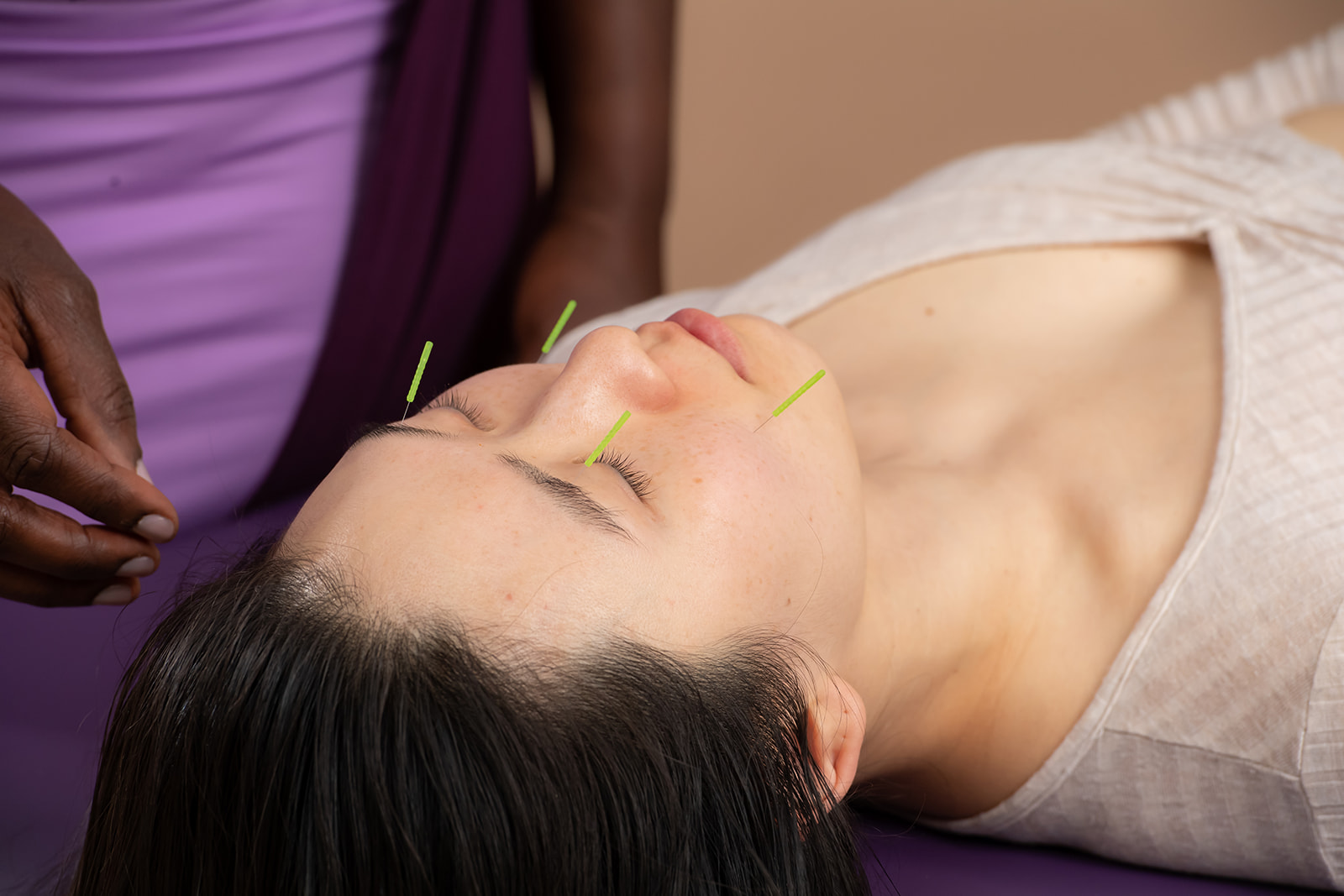Share
In this Article
Key Takeaways
| Topic | Summary |
|---|---|
| Introduction to Acupuncture | Acupuncture can enhance cognitive function by balancing the body’s energy (Qi), making it effective for mind-body wellness. |
| Neurophysiological Effects | It supports brain health by improving blood flow, modulating neurotransmitters, and boosting neuroplasticity. |
| Acupuncture Points | Specific points like GV20 can improve memory and focus, key for cognitive enhancement. |
| Research Evidence | Studies suggest acupuncture is effective for cognitive enhancement, especially for mild cognitive impairment. |
| Complementary Approaches | Combining acupuncture with cognitive training or mindfulness can further boost cognitive benefits. |
| Recommended Services and Products | |
Traditional Acupuncture
|
Traditional Acupuncture balances the mind, body, and spirit, enhancing cognitive functions like memory and concentration. Read More |
Essential Mist
|
Essential Mist combats stress and fatigue, promoting a dewy, glowing complexion while supporting cognitive health. Buy Now |
In a world that demands increasing cognitive agility, many people grapple with memory lapses, foggy thinking, and challenges in focusing. Fortunately, traditional practices like acupuncture are gaining recognition for their potential to enhance cognitive function, offering a natural approach to improve memory and concentration.
Building on the insights explored in the article “Acupuncture and Brain Health: How This Ancient Practice Can Support Cognitive Function“, this article delves deeper into the mechanisms by which acupuncture may influence memory and concentration. We’ll explore the scientific evidence, discuss factors affecting treatment outcomes, and unveil exciting possibilities for future research.

Get expert tips on healthy living and aging gracefully at 40 and beyond from me.
Success! Now check your email to confirm your subscription.
Introduction to Acupuncture and Cognitive Function
Acupuncture: A Time-Tested Tradition
Acupuncture, a cornerstone of Traditional Chinese Medicine (TCM) for over 2,000 years, involves inserting thin needles into specific points along meridians on the body. TCM theory posits that these points regulate the flow of vital energy, or qi, throughout the body. By stimulating these points, acupuncture is believed to restore balance and promote healing.
Cognitive Function: The Cornerstone of Mental Agility
Cognitive function refers to the mental processes that allow us to think, learn, reason, remember, and focus. It encompasses a range of abilities, including memory, concentration, attention, and problem-solving. Strong cognitive function is essential for navigating daily life, from remembering appointments and details to making sound decisions and learning new things.

Mechanisms of Action: How Acupuncture May Enhance Memory and Concentration
The precise mechanisms by which acupuncture influences cognitive function are still being elucidated. However, research suggests several potential pathways:
Neurophysiological Effects: Acupuncture is believed to stimulate the nervous system, leading to increased blood flow to the brain. This enhanced blood flow may deliver more oxygen and nutrients to brain cells, promoting overall brain health and function.
Neutransmitter Modulation: Acupuncture may influence the release and activity of neurotransmitters, the chemical messengers in the brain. Neurotransmitters like acetylcholine and glutamate play a crucial role in memory, learning, and concentration. Acupuncture’s ability to modulate these neurotransmitters could contribute to cognitive improvements.
Brain Region Stimulation: Studies suggest that acupuncture may stimulate specific brain regions associated with memory and concentration. For instance, research indicates that acupuncture can affect hippocampal activation, a brain structure critical for memory formation and retrieval.
Acupuncture Points and Techniques: A Tailored Approach
TCM practitioners select specific acupuncture points based on the individual’s needs and the desired outcome. Some commonly used points for cognitive enhancement include:
Shén Mén (DU 2): Located on the back, this point is believed to calm the mind and improve focus.
Guān Xuān (ST 4): Situated on the wrist, this point is said to invigorate the mind and enhance memory.
Zu San Li (ST 36): Located below the knee, this point is known as a general health booster and may also benefit cognitive function.
Various acupuncture techniques are employed, with the most common being manual acupuncture, where needles are inserted and manipulated by hand. Electroacupuncture involves using a small electrical current passed through the needles for added stimulation. Research suggests that different methods may yield varying cognitive improvement effects, with some techniques showing more significant benefits than others.
Clinical Evidence: Unveiling the Potential of Acupuncture

While acupuncture’s effectiveness for cognitive enhancement is a promising area of exploration, the current body of evidence remains mixed. Here’s a glimpse into the current research landscape:
Systematic Reviews and Meta-Analyses: Systematic reviews analyze the findings of multiple studies on a specific topic. Some reviews suggest that acupuncture may be effective in improving cognitive function in individuals with mild cognitive impairment (MCI) and Alzheimer’s disease. However, the overall quality of evidence is considered moderate, highlighting the need for more rigorous research with larger sample sizes and standardized protocols.
Case Studies and Pilot Trials: Pilot trials are smaller-scale studies designed to test the feasibility and effectiveness of a treatment approach. Encouraging results have emerged from pilot trials, with some studies demonstrating acupuncture’s potential to improve memory and concentration in patients with MCI. For instance, a pilot study involving 72 older adults with subjective cognitive decline (SCD) found that those receiving genuine acupuncture showed significant improvements in cognitive tests after a 12-week treatment period. Notably, the acupuncture group exhibited an increase in hippocampal volume and enhanced functional connectivity, factors crucial for memory and learning.
These findings, while promising, warrant further investigation with larger, controlled trials to solidify the evidence base for acupuncture’s role in cognitive enhancement.
Factors Influencing Effectiveness: Optimizing Treatment Outcomes
Several factors can influence the effectiveness of acupuncture for cognitive function:
Individual Variability: Age, overall health status, the severity of cognitive impairment, and individual responses to acupuncture can all impact treatment outcomes. While some individuals may experience significant benefits, others may show more modest improvements.
Acupuncture Protocol: The specific acupuncture points chosen, the number of needles used, and the frequency of treatments can influence the effectiveness of acupuncture. Tailoring the acupuncture protocol to the individual’s needs is crucial for maximizing results.
Complementary Therapies: Combining acupuncture with other therapies, such as cognitive training or pharmacological interventions, may enhance cognitive benefits. Some research suggests that integrated approaches can yield better outcomes than acupuncture alone.
Future Directions and Research Needs
While the current research on acupuncture for cognitive function is promising, further investigation is essential to solidify its role as a viable treatment option.
High-Quality Research: Large-scale, randomized controlled trials with rigorous methodology are needed to establish the efficacy of acupuncture for cognitive enhancement. These trials should include standardized acupuncture protocols, clear outcome measures, and appropriate control groups to minimize bias.
Potential for Broader Applications: Exploring the potential of acupuncture for preventing cognitive decline in aging populations is a promising area of research. Additionally, investigating acupuncture’s role in addressing cognitive impairments associated with mental health conditions, such as post-traumatic stress disorder (PTSD), could offer new avenues for treatment.
FAQ
The beauty of acupuncture lies in its personalized approach. There’s no one-size-fits-all acupoint prescription for cognitive enhancement. However, certain points have shown promise in boosting brainpower. For instance, GV20, located at the crown of the head, is often used to clear the mind and improve focus. GV4, found at the nape of the neck, is another popular choice for calming the spirit and enhancing mental clarity.
Points on the hands and feet, like LI4 and LV3, are also frequently employed. These points are believed to invigorate the mind and improve overall cognitive function. Remember, though, these are just a few examples. A skilled acupuncturist will carefully assess your individual needs and select the most appropriate points for your specific concerns. It’s like having a personal brain tune-up!
Electroacupuncture adds a modern twist to an ancient practice. It involves passing a mild electrical current through acupuncture needles. Some studies suggest that electroacupuncture might pack an extra punch when it comes to cognitive enhancement. The electrical stimulation can increase blood flow to the brain, potentially boosting cognitive function.
However, more research is needed to definitively say whether electroacupuncture is superior to traditional acupuncture for cognitive improvement. It’s possible that the benefits vary depending on the individual and the specific condition being treated. Ultimately, the best approach depends on your preferences and your acupuncturist’s expertise.
While acupuncture has been used for centuries, large-scale, long-term studies on its cognitive benefits are still relatively new. Many studies have focused on short-term outcomes, which have shown promise. However, understanding the long-term effects of acupuncture on cognitive function is crucial for making informed decisions.
That said, the available evidence is encouraging. Some studies suggest that acupuncture may help slow cognitive decline in conditions like Alzheimer’s disease. But we need more robust research to confirm these findings. Stay tuned, as scientists continue to delve deeper into the world of acupuncture and brain health.
Acupuncture is generally considered safe when performed by a qualified practitioner. However, like any medical treatment, it can have side effects. Fortunately, serious side effects are rare. You might experience mild discomfort or soreness at the needle insertion sites. In some cases, people report feeling relaxed or even sleepy after a session.
It’s important to note that there’s no evidence to suggest that acupuncture has any negative impact on cognitive function. In fact, many people report improved mental clarity and focus after acupuncture treatments. If you have any concerns about potential side effects, be sure to discuss them with your acupuncturist.
Acupuncture can often be used alongside conventional treatments for cognitive impairment. It’s like adding another tool to your toolbox. For example, acupuncture might complement medication by enhancing its effects or reducing side effects. It can also be combined with cognitive training exercises or lifestyle modifications to optimize brain health.
However, it’s crucial to consult with your healthcare provider before starting any new treatment, including acupuncture. They can help you determine the best approach for your specific situation and ensure that there are no potential interactions between acupuncture and other medications or therapies.
Conclusion
Acupuncture holds the potential to be a valuable tool for enhancing cognitive function, particularly memory and concentration. While the evidence is still developing, the available research suggests that acupuncture may offer a complementary approach for individuals seeking to improve their mental clarity and focus.
It’s essential to consult with a qualified acupuncturist to discuss your specific needs and goals. By combining acupuncture with healthy lifestyle practices and other evidence-based interventions, individuals may be able to optimize their cognitive function and enjoy a higher quality of life.
As research progresses, we can anticipate a deeper understanding of acupuncture’s mechanisms of action and its role in promoting cognitive health. The future holds exciting possibilities for harnessing the power of this ancient practice to unlock the full potential of the human mind.
Self-care is an essential aspect of my philosophy, and it’s why I have created products such as my Essential Mist. This invigorating mist is composed of a White Tea and Rosewater base with a reparative blend of Prebiotics and East Asian Medicinal plants of Ginseng and Tremella, which helps combat stress, dehydration, and fatigue. Additionally, I offer consultations for those who are looking to further prioritize their self-care and wellness journey.







